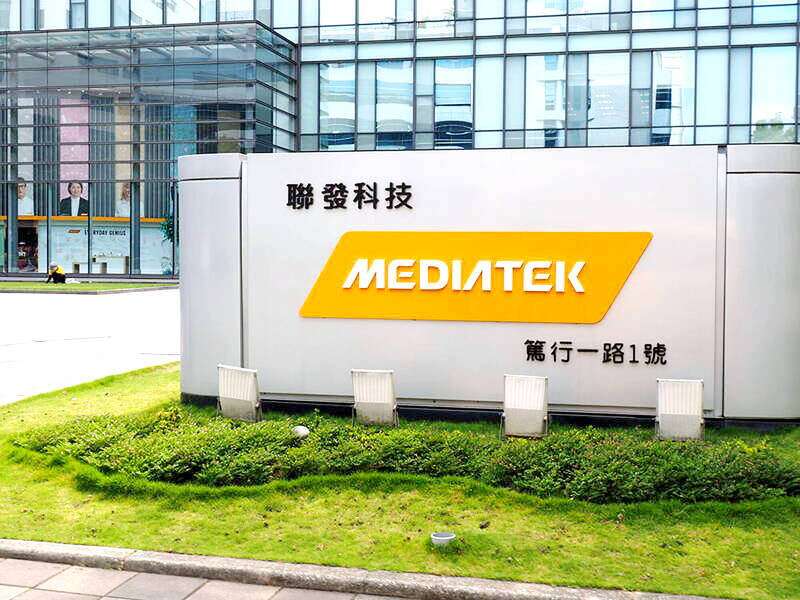MediaTek Inc (聯發科) on Wednesday launched a new flagship smartphone chip, Dimensity 9400, made with Taiwan Semiconductor Manufacturing Co’s (TSMC, 台積電) enhanced 3-nanometer technology, aiming to bring more artificial intelligence (AI) applications to edge devices like phones.
The Dimensity 9400 is the second smartphone chip using TSMC’s second-generation 3-nanometer technology, after Apple Inc’s A18 Pro chip for the new iPhone 16 series.
The new mobile chip has 28 percent more transistors, offers up to 80 percent faster large language model performance and is up to 35 percent more power-efficient than its predecessor, Dimensity 9300, MediaTek said.

Photo:EPA-EFE
Chinese smartphone makers Xiaomi Corp (小米), Oppo Mobile Telecommunications Corp (歐珀) and Vivo Communication Technology Co (維沃) are among the first-wave adopters of the new chip in their new premium models, while Samsung Electronics Co is to adopt the Dimensity 9400 for its Galaxy S25 phone rather than the Samsung-designed Exynos chip or Qualcomm Inc’s Snapdragon 8 Gen 4 chip.
New smartphones featuring the Dimensity 9400 are expected to hit stores later this quarter, companies said.
“The Dimensity 9400 will continue furthering our mission to be the enablers of AI, supporting powerful applications that anticipate users’ needs and adapt to their preferences,” MediaTek president Joe Chen (陳冠州) said.
MediaTek on Wednesday also reported that revenue last month grew by 23.83 percent year-on-year and was up 7.58 percent month-on-month to NT$44.68 billion (US$1.39 billion).
That brought the company’s third-quarter revenue to NT$131.82 billion, up 3.58 percent from NT$127.27 billion the previous quarter and within the company’s forecast of NT$123.5 billion to NT$132.4 billion.
In the first nine months of this year, revenue totaled NT$392.54 billion, up 29.18 percent from NT$303.88 billion in the same period last year.
MediaTek has said that it expects flagship chip revenue to grow about 50 percent this year compared with last year and hopes the launch of the Dimensity 9400 would help extend its revenue growth momentum into next year.

BYPASSING CHINA TARIFFS: In the first five months of this year, Foxconn sent US$4.4bn of iPhones to the US from India, compared with US$3.7bn in the whole of last year Nearly all the iPhones exported by Foxconn Technology Group (富士康科技集團) from India went to the US between March and last month, customs data showed, far above last year’s average of 50 percent and a clear sign of Apple Inc’s efforts to bypass high US tariffs imposed on China. The numbers, being reported by Reuters for the first time, show that Apple has realigned its India exports to almost exclusively serve the US market, when previously the devices were more widely distributed to nations including the Netherlands and the Czech Republic. During March to last month, Foxconn, known as Hon Hai Precision Industry

Taiwan Semiconductor Manufacturing Co (TSMC, 台積電) and the University of Tokyo (UTokyo) yesterday announced the launch of the TSMC-UTokyo Lab to promote advanced semiconductor research, education and talent development. The lab is TSMC’s first laboratory collaboration with a university outside Taiwan, the company said in a statement. The lab would leverage “the extensive knowledge, experience, and creativity” of both institutions, the company said. It is located in the Asano Section of UTokyo’s Hongo, Tokyo, campus and would be managed by UTokyo faculty, guided by directors from UTokyo and TSMC, the company said. TSMC began working with UTokyo in 2019, resulting in 21 research projects,

Ashton Hall’s morning routine involves dunking his head in iced Saratoga Spring Water. For the company that sells the bottled water — Hall’s brand of choice for drinking, brushing his teeth and submerging himself — that is fantastic news. “We’re so thankful to this incredible fitness influencer called Ashton Hall,” Saratoga owner Primo Brands Corp’s CEO Robbert Rietbroek said on an earnings call after Hall’s morning routine video went viral. “He really helped put our brand on the map.” Primo Brands, which was not affiliated with Hall when he made his video, is among the increasing number of companies benefiting from influencer

Quanta Computer Inc (廣達) chairman Barry Lam (林百里) yesterday expressed a downbeat view about the prospects of humanoid robots, given high manufacturing costs and a lack of target customers. Despite rising demand and high expectations for humanoid robots, high research-and-development costs and uncertain profitability remain major concerns, Lam told reporters following the company’s annual shareholders’ meeting in Taoyuan. “Since it seems a bit unworthy to use such high-cost robots to do household chores, I believe robots designed for specific purposes would be more valuable and present a better business opportunity,” Lam said Instead of investing in humanoid robots, Quanta has opted to invest